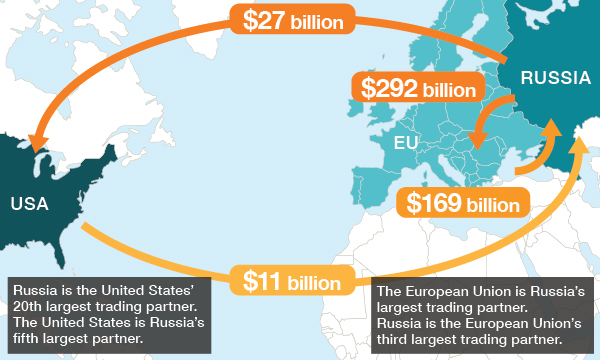
European politicians are eloquent enough as they pronounce speeches about the need to counter the «Russian aggression» and defend democracy and «territorial integrity» of Ukraine. But everyone who knows the first thing about politics realizes it’s nothing but words. What democracy are they talking about when the incumbent regime in Kiev came to power as a result of neo-Nazi coup to repress dissenters and establish press censorship they call a «moratorium on criticizing the government?»
The defence of «territorial integrity» is guaranteed by mass massacre of civilians living in the two regions that said yes to independence at referendums. In comparison no referendum was held in Kosovo but it was immediately recognized by the United States and the European Union member-states.
No matter how hard they tried, the intelligence services of the United States, Ukraine and Europe have never produced any evidence of Russia’s support for Donbass insurgents at the time Russia has many times come up with proof testifying to the fact that Ukrainian military fired shots across the border and even conducted armed intrusions into Russian territory.
Anyone who can think realizes that the United States is waging war to subjugate Europe with the help of Ukrainian leadership and its agents in Brussels. They exert great effort to demonize Russia and provoke it into a direct intervention in Ukraine to justify the story invented by Washington about «Russian aggression» that is spread around in Europe fooling people.
Nobody argues with Clausewitz’s famous line that “War is a mere continuation of politics by other means” and Vladimir Lenin’s words that that «Politics is a concentrated expression of economics». As a result of two world wars the US economy got a powerful impulse for development while Europe was in ruins becoming dependent on the United States. As time went by American strategists learned to wage bloodless financial and economic wars. An economic war is being waged today. The goal is to destroy Europe again to male it fully dependent on Washington.
The Europe’s intent to re-industrialize prompted the United States to launch a new phase of economic war. In the 1980-2000s Germany, France and Italy, as well as former members of socialist camp, gradually reduced industrial capacity in favor of service non-manufacturing business: services and insurance. By the early 2000s it became clear that Europe has no future if it continues to follow this policy, so European politicians started to talk about the need to revive the industrial potential that would become a tough competitor to US producers.
Economic progress boosts energy consumption. While pressing other countries to accede, Washington signed, but never ratified, the Kyoto Protocol designed as the main instrument to reduce carbon dioxide emissions in countries obligated to significantly reduce heavy industry. The advent of new technology allowed Europe to go on with industrial growth policy.
To frustrate the Europe’s plans, the United States initiated a chain of color revolutions in the Middle East. The regimes predominantly loyal to Europe were substituted by radical Islamists rulers hostile to European civilization. They were even more hostile to the United States, but it was Europe, not the US, who happened to be taken hostage as the European Union was dependent on oil and gas supplied by radical regimes. The US has given life to these Islamist movements and organizations and it continues to cooperate and influence them.

At that Russia remains the main Europe’s energy supplier. There was an attempt to interrupt energy deliveries during the Russia-Ukraine gas wars in 2006-2009. The US organized the Maidan protests in Ukraine to make come to power the political forces that could stop supplies at any moment under the pretext of countering Russia. According to the US plans, the coup was to take place at the time of 2015 presidential election.
America had to expedite the process as another plan to weaken Europe happened to be in jeopardy. The association agreement between the European Union and Ukraine was not concluded as expected. The agreement was destructive for Ukraine’s economy and the European Union was to spend huge sums to save Ukraine in a year after it was signed. Supported by its fifth column in Europe – Poland and the Baltic States – the United States was the leading lobbyist pushing the parties to sign the document.
The start of «sanctions war» against Russia was an hour of triumph for the United States eager to destroy the European economy. Under the US pressure the European Union joined the punitive measures that led Europe to stagnation. The GDP of Germany and Italy is down by 0, 2%. The expected downturn in the Baltic States may be as high as 10%. It can be worse if the estimates take into account the Russia’s retaliatory measures threatening the whole branches of Europe’s economy.
The third package of sanctions is not aimed at Russian officials and tycoons with close ties with the government. The main goal is to damage the Russian oil and gas industry and complicate Russian energy supplies to Europe. In other words the United Sates aims to create obstacles on the way of re-industrialization.
European experts have already come to the conclusion that there is no alternative to Russian gas. The sanctions hinder the plans to increase supplies and even keep them at the present level. Ceding to the US pressure Europeans have made the plans to industrialize impossible to fulfill. The European Union has doomed itself to be a loser in the competition with the United States. Moreover, it can become dependent on the United States as it happened after the world wars when Europe destroyed its own industrial might.
As time goes by Europe will recover and restore the industry destroyed to please the USA. But for the next twenty years the old continent will have to reconcile with its dependence on America making impossible enhancing grassroots’ living standards.
Alexander DONETSKY | SCF
http://www.strategic-culture.org/news/2014/08/28/us-wages-war-against-eu-make-europeans-do-fighting-and-shoulder-expenditure.html
